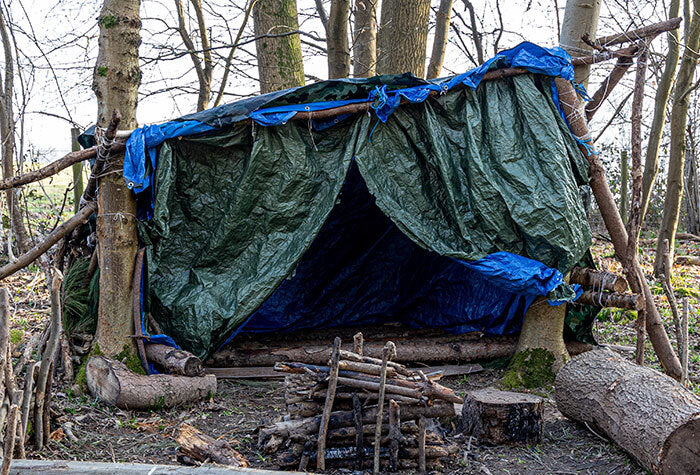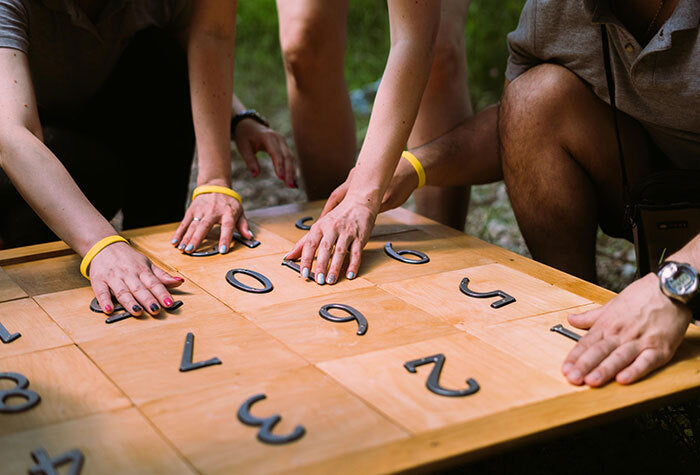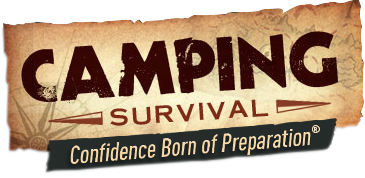
Psychological Warfare Survival: Techniques for Mental Endurance in Crisis Situations
You’ve got your bug-out bag packed. You’ve been practicing bushcraft day and night. But when disaster strikes, you still might be ground up and spit out like the rest of the sheeple.
The reason? As diligent as you were in every other area of preparedness, you neglected the most important survival muscle: your mind.
Catastrophe is a pressure cooker. Make sure your psyche is bulletproof with the tactics below.

Mental Simulation and Preparedness
In a survival situation—particularly for those distrusting governmental and societal structures—the ability to mentally simulate potential threats, from natural disasters to governmental overreach or even betrayal within a community, is paramount.
This skill isn't theoretical; it's rooted in historical precedent and practical necessity.
For example: during the Cold War, the specter of nuclear annihilation led to an era where both government and civilians engaged in extensive preparedness activities. Families built fallout shelters, schools conducted drills, and governments simulated various scenarios of nuclear war.
This wasn't mere paranoia, but a structured approach to preparing the psyche for a wide range of possible outcomes. They ensured that if the worst were to happen, mental shock wouldn’t paralyze critical response mechanisms.
HOW IT WORKS
To harness the power of mental simulation and preparedness in today's uncertain world, one must start by educating themselves on the potential threats specific to their region and situation. This involves:
Research and Scenario Planning – Engage with a wide range of materials, from historical accounts of survival in similar circumstances to governmental and non-governmental reports on potential future risks. Use this knowledge to develop detailed scenarios that you might face.
Mental Rehearsal – Regularly set aside time to rehearse how you would respond to these scenarios mentally. This includes visualizing your actions step by step, feeling the emotions you might experience, and planning how you would mitigate them. For instance, if you're preparing for a scenario where government actions threaten your autonomy, mentally rehearse how you would maintain communication, travel, and resource allocation under such conditions.
Physical Drills – Whenever possible, transform mental rehearsals into physical drills. If you've mentally prepared for a scenario where you must leave your home due to a governmental lockdown or natural disaster, practice packing your bug-out bag, navigating your escape route, and setting up temporary shelter.
Related Read: Preparedness Mistakes and How to Prevent Them

Stress Inoculation Training (SIT)
Survival situations often entail high-stress environments where the ability to remain calm and make clear-headed decisions can make the difference between life and death.
Stress Inoculation Training (SIT) prepares individuals not just for the wilderness, but for the psychological warfare that might be waged against them by government entities or malicious neighbors. SIT has been effectively used in military training to prepare soldiers for the stress of combat and captivity.
An example of this is the SERE (Survival, Evasion, Resistance and Escape) program, designed to prepare military personnel to survive hostile environments and resist enemy interrogation. The program's intense training regimens simulate stressors under controlled conditions, pushing soldiers to develop coping mechanisms and resilience.
HOW IT WORKS
Applying SIT in a preparedness context—especially when distrust towards authoritative entities and external threats is prevalent—involves several key strategies:
Understanding Stress Responses – Begin by educating yourself on the physiological and psychological responses to stress. Understanding these responses allows you to recognize them in real time and implement strategies to mitigate their effects.
Incremental Exposure – Gradually expose yourself to stressors in a controlled manner. Start with scenarios that are mildly stressful and systematically work your way up to more challenging situations. For example: if you're preparing for potential government overreach impacting your freedom of movement, start by practicing survival skills in increasingly remote or challenging environments to simulate restricted conditions.
Related Read: Surviving the Unthinkable - How to Stay Alive in the World's Most Extreme Environments
Coping Strategies – Develop a toolkit of coping strategies. This can include breathing techniques, mindfulness, positive self-talk, and visualization strategies. Practice these techniques regularly—especially during your incremental exposure exercises—to build an automatic response.
Debriefing and Reflection – After each simulated stressor or training session, take the time to debrief. Reflect on what stress responses you noticed, how effectively you implemented your coping strategies, and what improvements can be made for next time.

Building Emotional Resilience
Emotional resilience is crucial in survival situations, where the ability to bounce back from setbacks, fear, and uncertainty can determine success or failure. This quality is especially vital in the face of attempts to demoralize or break the spirit through psychological warfare, whether from government actions, societal collapse, or within hostile environments.
Historically, emotional resilience has been a key factor in the survival stories of POWs (prisoners of war) and those in concentration camps during WWII. Viktor Frankl's Man's Search for Meaning emphasizes the crucial role of finding meaning in life, even amidst the horrors of Nazi death camps. He observed that prisoners who focused on future goals or personal values were more likely to survive. For Frankl, developing his psychological theory of logotherapy gave him the inner strength to endure the suffering.
He proposed that life's primary motivation is the pursuit of meaning, not pleasure. In the camps, this quest for meaning helped prisoners maintain their humanity and spiritual well-being.
Frankl's experience illustrates that a sense of purpose can be a powerful source of resilience, helping individuals to overcome extreme adversity. His insights reveal the profound impact of purpose on psychological survival and underscore the importance of meaning in fostering emotional resilience.
HOW IT WORKS
To cultivate emotional resilience in preparation for any crisis situation—including the kind of psychological warfare that preppers often fear—consider the following strategies:
Find Meaning in Adversity – Like Frankl's observations, focus on finding a personal sense of purpose in survival challenges. This could involve a commitment to protecting your family, preserving certain knowledge or skills, or simply the will to bear witness and survive to tell your story.
Practice Mindfulness and Acceptance – Regular practice of mindfulness can enhance your ability to stay present and reduce negative reactions to stress. Acceptance of the situation as it is, rather than what you wish it could be, allows for a more adaptive response.
Develop a Support Network – Emotional resilience is bolstered by strong social connections. Build a network of like-minded individuals who share your survival goals. Regularly engage in supportive, honest discussions about fears, hopes, and strategies for overcoming psychological challenges.
Engage in Regular Reflection – Dedicate time to reflect on past challenges you’ve overcome and the strengths you utilized to do so. This not only reinforces a positive self-image, but helps identify personal resilience strategies that work for you.
Adopt a Growth Mindset – View challenges as opportunities to learn and grow rather than insurmountable obstacles. This mindset encourages adaptability and perseverance.
Physical Wellness – Emotional resilience is closely tied to physical well-being. Practice regular exercise, adequate sleep, and proper nutrition to maintain a strong foundation for mental health.

Cognitive Flexibility
Cognitive flexibility is the mental ability to switch between thinking about two different concepts, or thinking about multiple concepts simultaneously. It is crucial in adapting to rapidly changing or unpredictable survival scenarios.
This took center stage for leaders in the Gulf War. The coalition forces led by the United States faced a significant challenge in discerning genuine intelligence from Iraqi misinformation. Saddam Hussein's regime released false information about the strength and deployment of Iraqi forces, including the use of decoys and feints. This required military leaders to be cognitively flexible, constantly updating their strategies in response to new, often conflicting information.
The ability to adapt quickly to the evolving battlefield conditions was essential. This same adaptability is necessary for survivalists who may face rapidly changing situations where misinformation could lead to dire consequences.
Understanding the context and learning from historical military strategies can enhance one's ability to stay agile and responsive in a crisis.
HOW IT WORKS
Practice Solving Problems in Different Contexts – Regularly challenge yourself with puzzles, games, and scenarios that require thinking outside the box. The more diverse these challenges are, the better.
Learn New Skills – Regularly learning new, unrelated skills—like a new language, physical skill, or craft—forces your brain to create new neural pathways, enhancing cognitive flexibility.
Scenario Planning – Engage in scenario-planning exercises that require you to consider multiple outcomes and responses. This not only prepares you for various survival scenarios, but trains your brain to think flexibly.
Mindful Observation – Spend time in nature or unfamiliar environments, consciously observing and trying to understand the systems at play. This practice can help improve your ability to notice details and patterns, a key aspect of cognitive flexibility.
Related Read: 5 Critical Survival Skills You Need to Master

Information Discrimination
The ability to discern trustworthy information from misinformation is vital, especially when facing psychological operations intended to mislead or manipulate.
HOW IT WORKS
Critical Thinking Exercises – Regularly engage in exercises that challenge your assumptions and require you to evaluate the credibility of sources.
Diversify Information Sources – Avoid relying on a single source of information. By diversifying your information intake, you’re less likely to fall victim to misinformation.
Fact-Checking Habits – Develop the habit of fact-checking information, especially if it significantly influences your survival strategies. Utilize credible fact-checking organizations and learn basic research techniques to verify information.
Social Media Literacy – Given the prevalence of misinformation on social media, it's crucial to develop skills to critically evaluate the credibility of online content, including understanding biases and recognizing common disinformation tactics.
Psychological Detachment
Psychological detachment—the ability to mentally disengage from stressors—is crucial for long-term mental health and resilience in survival situations.
HOW IT WORKS
Mindfulness and Meditation – Regular practice can help you learn to observe your thoughts and feelings without becoming emotionally overwhelmed by them.
Visualization Techniques – Use visualization to transport your mind to a place of safety and calm, even when your physical environment is anything but.
Scheduled Worry Times – By scheduling specific times to process worries and stress, you can contain and channel the mental energy spent on these concerns, allowing for detachment during other parts of the day.
Hobbies and Creative Outlets – Engage in activities that fully absorb your attention and provide a break from survival-related stresses. This could include art, writing, or any task that requires concentration and provides satisfaction.
By mastering these psychological techniques, wilderness survivalists and preppers can enhance their mental endurance, preparing them to not just survive, but thrive in crisis situations.

ARNOLDO VILLEDA-DIAZ
THANK YOU VERY MUCH; FOR ALL TINGS GIVE US…
AGAIN THANKS…